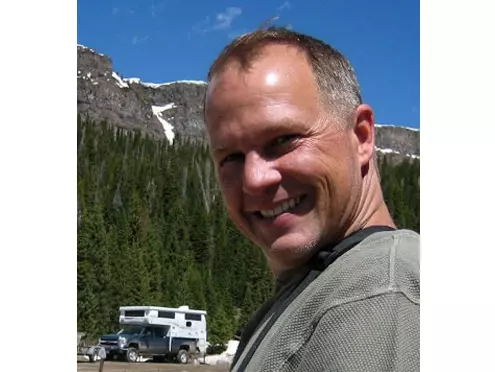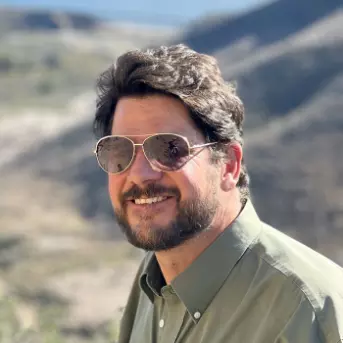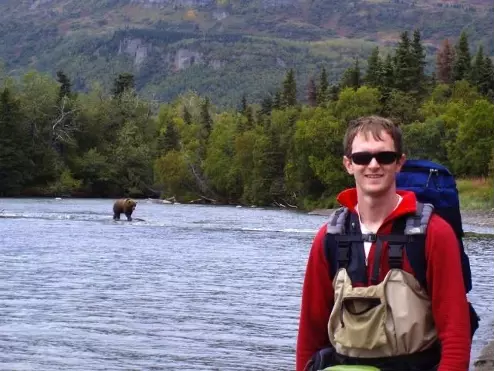Vote Yes on 127!
Supporters' Voices
CATs collaborates with a vast team of individuals and organizations to help guide our work. We receive trusted guidance from leading wild cat ecologists, researchers, conservationists, and wildlife agency leaders, who have substantial experience with mountain lion, bobcat and lynx ecology, behavior and management policies for conflict, including public safety, livestock, pets and ongoing coexistence.
Not All Hunting Can or Should Be Defended
“There are many examples of wildlife that are not hunted and their populations are not “exploding” as many in the hunting community might want you to believe – a good example is Bald Eagles and Golden Eagles or even states like California where mountain lion hunting has been banned for a half-century.”

By Dave Ruane
Colorado hunter and CATs member
Dave is an avid naturalist and outdoorsman, and much of his camping is accompanied by hiking, wildlife watching, birdwatching, searching for reptiles and amphibians, fishing, (elk and deer) hunting, and trail camera photography. He is a proud member of CATs.
I have been hunting my entire adult life and quickly realized the difference between trophy, “thrill killing” and the type of hunting that doesn’t fall into those categories, such as sustenance hunting. Mountain Lion hunting almost always falls into the trophy and/or “thrill kill” category
(continued, use cursor for dropdown)
Hunting and especially trapping continue to be tainted by controversy. Ethical hunters can understand many of the arguments and know there is room for improvement and “house cleaning.” The “low-hanging fruit” in this clean-up is easily predator hunting since it is based on trophy or thrill killing rather than any realistic/sustainable provision of food and has little if anything to do with the scientific management of wildlife.
Trapping and the resultant sale of furs is especially a conflict of interest since it is allowing a tiny fraction of society to profit from the public’s trust of wildlife. Even the oft-recognized North American Model of Wildlife Conservation, seems to “give a pass” or avoid the topic of commercialization of wildlife parts from trapping altogether, whereas making it clear that market hunting is not allowable. Such an obvious flaw! To sum this up, the black eye that hunters get from the hunting and trapping of predators isn’t worth the tiny number of participants engaged in these activities.
Science has proven that mountain lion populations are self-regulating, as prey base becomes more abundant, predator populations also thrive; as prey base declines, predator populations respond in kind. While there is science suggesting that predator populations can withstand hunting pressure, it is my understanding that those studies are based on well documented population numbers — something that is very much NOT the case in Colorado where mountain lion populations are estimated at around 3,500 individuals or TWICE that! The huge range shows that we have no idea how many exist.
Bobcat numbers and the restored Lynx are an even bigger guess. In fact, our state wildlife agency has admitted they really do not have any good estimates on mountain lion, bobcat, Lynx, and other wildlife and has even initiated research to resolve/improve that issue. In other words — there is no “conservation” need to hunt mountain lions, bobcats, and other predators — it’s just a desire, and a desire by a relatively tiny fraction of the hunting community that has no issue using hounds, traps or other non-fair-chase methods — quite the travesty!
There are many examples of wildlife that are not hunted and their populations are not “exploding” as many in the hunting community might want you to believe — a good example is Bald Eagles and Golden Eagles or even states like California where mountain lion hunting has been banned for a half-century. Contrast that with coyotes that are incredibly persecuted in the name of “conservation” – there are studies suggesting that hunting pressure on coyotes has actually caused their populations to soar! To add, there are known cases where the hunting of mountain lions creates orphaned kittens and subadults that have attacked humans since they did not benefit from the training/learning they normally would have received from their mother. As well, territory disruption when an adult male mountain lion is killed can also cause increases in livestock depredation.
In summary, I am very much against the hunting/trapping of Colorado’s wild cats because it is unnecessary and deleterious to the reputation of hunting and the common perception or definition of conservation.
Dave is an avid naturalist and outdoorsman, and much of his camping is accompanied by hiking, wildlife watching, birdwatching, searching for reptiles and amphibians, fishing, (elk and deer) hunting, and trail camera photography. He is a proud member of CATs.

By Erik Molvar
Wildlife Biologist, Lifelong Hunter and CATs member
Erik is a lifelong hunter and wildlife biologist with published research in the behavior, ecology, and population dynamics of Alaskan moose as well as large-scale conservation planning. He spent 13 years as a conservation advocate and later Executive Director of Wyoming-based Biodiversity Conservation Alliance. He is one of the conservation community’s leaders in sage grouse conservation and recovery. He is the author of 16 hiking guidebooks and backpacking techniques manuals for national parks and wilderness areas spanning the West from Alaska to Arizona.
He works as Executive Director for Western Watersheds Project in Idaho and lives in Laramie, Wyoming.
Humans have been hunting for hundreds of thousands of years, and in the least-developed parts of the planet — often the places with the healthiest ecosystems — humans still participate in subsistence economies based on hunting and gathering. They recognize that animals are our relatives, which western science has more recently “discovered.” Indigenous subsistence hunting is honorable, in my view, and a model for non-Indigenous hunters to emulate.
(continued, use cursor for dropdown)
Carnivores regulate their own populations through territoriality, self-limiting their own populations. There is no useful role for wildlife management, let alone hunting, in controlling their populations.
There is no legitimate excuse for hunting or trapping big cats. We hunters need to stop making excuses for mountain lion and bobcat hunting or trapping, and need to speak out against these offensive practices. Standing by silently is a form of assent, and makes us accomplices to these crimes against nature.
As human society becomes increasingly conscious of the consequences of our dietary and recreational choices, hunters who kill recklessly and without defensible purpose threaten the continuation of all hunting, not just the trophy hunting that seeks to gratify the ego and serves as a basis for bragging. Running a mountain lion with dogs to exhaustion and then shooting the cornered animal as it cowers in a tree is a serious violation of fair chase principles. Trapping is likewise a dirty and underhanded method of killing an animal, a violation of fair chase principles notwithstanding the North American Model of Wildlife Conservation’s hypocritical loophole for it.
Hunters have always been a minority of the American population, and today perhaps four percent of Americans are hunters. Increasingly, we hunters are outnumbered by Americans who hold animal rights or animal welfare values. When unethical hunters engage in killing for sport or trophies, wasting the meat, they hasten the day when the voter public will shut down all hunting, ethically defensible or not. If hunting is to survive in democratic nations like ours, we hunters need to police our own, and condemn and push to outlaw trapping and forms of hunting that violate ethical principles regarding fair chase and the prohibition on wanton waste. Hunting and trapping of bobcats and mountain lions cannot be defended as ethically sound practices, and should be outlawed by state agencies. Other ethically indefensible practices, like hunting over bait, predator-killing contests, chasing with hounds, and “misting” prairie dogs, must similarly be shut down for good.
We hunters need to clean up our own act, before others with less sympathy and tolerance for hunting do it for us.
“Wild cat hunting and trapping violates the North American Model, it is no longer socially acceptable and that’s why it’s time to relegate this to the history books and get rid of antiquated practices that tarnish ethical hunters. GPS hounding of lions merely reduces the practice to shooting, not hunting.”

By Charles Seymour
Avid Angler in Colorado and member of CATs
Charles is an avid angler in Colorado who supports protection of mountain lions, bobcats and lynx in Colorado.
The reason I am opposed to mountain lion and bobcat hunting, hounding and trapping, is because I don’t find it to be socially acceptable and using GPS-collared packs of hounds is something that gives ethical hunters a bad name…we get “grouped” together with trophy hunters.
(continued, use cursor for dropdown)
The choice to permit trophy hunts of wild cats and trapping them for personal profit rests on our ethics, values, and fair chase principles. Hunting mountain lions and trapping bobcats is not serving any valid conservation purpose, it is orphaning kittens, and allowing the sale of their fur for the trapper. Check out the results of the fur auction (2020) – the price of the fur is extremely low and this essentially de-values wildlife and the vast majority of us place a much higher value on the lives of these animals on the landscape alive https://coloradotrapper.com/fur-action/
Wild cat hunting and trapping violates the North American Model, it is no longer socially acceptable and that’s why it’s time to relegate this to the history books and get rid of antiquated practices that tarnish ethical hunters. GPS hounding of lions merely reduces the practice to shooting, not hunting.
I once saw a picture of a trophy hunter grinning ear to ear with the photo taken moments before he shot a lion out of a tree with his hounds at the base of the tree. He had both arms up in the air as if to declare “victory” before taking a shot from about 10 yards away on a lion that was stationary in a tree. This is simply not hunting…it’s shooting.
9 principles of 'sportsmanlike' behavior
by Brett Ochs, Colorado hunter and CATs member
- Speak up against proposals like continued Trophy hunting/trapping using any means possible. The humans who agree with those statements are not hunters, they are shooters.
- Know, understand, identify, and respect the animals and the habitat they live in.
- Give fair chase for the animal you are pursuing. (You have a HUGE advantage with a rifle.)
- Use no baiting, spotlighting, dogs, smells, or other various methods of “attracting” animals.
- No shooting of young offspring, pregnant mothers, or taking more than you can use.
- When you do harvest an animal, give it the respect that it deserves by honoring it and all that it is providing you. This also means using all parts of this animal and not just the parts that feed the ego, i.e. antlers.
- Appreciate the carnivores that need this same animal to survive. Take a stand against anyone who believes we are better without carnivores. Big picture, folks!
- Walk, sit, scan, breathe, and feel the landscape. Get up early walk in the night (without headlamps), watch the sunrise, and shiver, so that you appreciate what it takes to survive without the comforts we have.
- Be grateful for the opportunity and privilege you have.
Scientists and Veterinarians
(You can pause on the carousel by hovering over the quote)
"This is not a hunt. All the high tech gadgetry, the GPS collars with dogs doing all the work while the ‘hunter’ sits in his truck drinking coffee until the cat is treed … you might as well call the dogs off and go home because this is not a hunt.”
From Harley G. Shaw for CATs campaign, research biologist with Arizona Game and Fish Department, retired
Author of Soul among Lions: The Cougar as Peaceful Adversary
"There is no justifiable reason to allow bobcats to be trapped and killed for their fur in Colorado. Societal values have shifted and it is no longer acceptable or necessary. The collateral damage to innocent wildlife who are inadvertently trapped, mortally wounded, or die as a result of exposure to harsh elements in the thousands of bobcat traps set on public and private lands every year — such as endangered lynx, golden eagles, and other animals — is an atrocity."
From Christine Capaldo, DVM for the CATs campaign —
a licensed and practicing veterinarian in Telluride, Colorado
“The risk of a cougar attack — on people or domestic animals — is extremely low, and almost zero with pragmatic precautions. Fewer than two dozen people have been killed by cougars in North America in the past 100 years.”
director of the puma program at Panthera, a nonprofit organization focused on protecting wild cats and the ecosystems they inhabit
"But I simply cannot put myself into the mind of a person who pays thousands of dollars to go and kill beautiful animals simply to boast, to show off their skill or their courage. Especially as it often involves no skill or courage whatsoever, when the prey is shot with a high powered rifle from a safe distance. How can anyone with an ounce of compassion be proud of killing these magnificent creatures? Lions, leopards, sable antelopes, giraffes and all the other sport or trophy animals are beautiful — but only in life. In death they represent the sad victims of a sadistic desire to attract praise from their friends at the expense of innocent creatures. And when they claim they respect their victims and experience emotions of happiness at the time of the killing, then surely this must be the joy of a diseased mind."
Jane Goodall, Ph.D., DBE and Founder, the Jane Goodall Institute & UN Messenger of Peace —
Jane Goodall, Ph.D., DBE and Founder, the Jane Goodall Institute & UN Messenger of Peace —
"Trophy hunters, whether they realize it or not, are likely hunting for status. It's like driving a luxury car, though in this case the lives of animals are taken."
Dr. Chris Darimont, Conservation scientist in an interview with former CU Boulder professor Marc Bekoff —
about his essay Why men trophy hunt published in Biology Letters
"Hunting is not a substitute for good animal husbandry practices. Hunting doesn’t prevent depredations, and by orphaning cubs or opening up space on the landscape that young, inexperienced mountain lions occupy, hunting can cause depredations to increase. The solution to living alongside mountain lions is to be good neighbors, using fencing, livestock guardian dogs, range riders, and other deterrents and protections to keep livestock safe from big cats, and big cats safe from people and livestock."
Josh Rosneau, Phd., mammalogist, biologist and conservation advocate with the Mountain Lion Foundation
“Whenever you have trophy hunting mountain lions, you will have created orphans.”
Rick Hopkins —
a nationally recognized wildlife ecologist, who has dedicated more than 45 years to the study of large mammalian carnivores
“When you kill one older dominant male (cougar), three younger guys come to the funeral.”
Robert Wielgus
Ph.D. a retired Associate Professor and Director of the Large Carnivore Conservation Lab at Washington State University. He is an internationally recognized expert in the study of large carnivores and has published over 30 peer reviewed scientific papers
“Sport hunting is not an effective tool for anything other than providing an opportunity for sport hunting,”
the late Professor John Laundré —
Western Oregon University, author of Phantoms of the Prairie: Return of Cougars to the Midwest
“Mountain lions play an important role in keeping deer herds healthy, especially when it comes to reducing transmission and prevalence of highly infectious Chronic Wasting Disease. Deer hunters and anyone who cares about the health of the forests and all life can appreciate that fact.”
Jim Keen, DVM Ph.D —
has worked primarily as a veterinary infectious disease and public health researcher at the USDA in Nebraska and at the University of Nebraska over the past 30 years. He has over a quarter-century of research experience in public health, biomedicine, zoonotic infections, and livestock health and production medicine.
“Most hunting can be ethically defended. Some cannot. Change, where necessary, is our only hope of survival. Antihunters may hold a spotlight on our behavior, but through our behavior we control what they see. And new technology will always present opportunities and challenges.”
Bear biologist Tom Beck —
Retired Colorado Division of Wildlife
“The wheels would not fall off the bus if Colorado stopped sport hunting mountain lions today. Recreational hunting of mountain lions does nothing to protect livestock, human or pet safety or produce more elk and deer for hunters to shoot.”
Rick Hopkins —
Puma Population Ecologist for four decades
"Hunters who refuse to play fair are a threat to us all. Not only do they worsen wildlife conservation efforts and put us all in danger, they are giving good hunters a bad name by discarding responsible hunting ethos…But it’s not only trophy hunting and illegal poaching that’s the problem. Research clearly indicates that Colorado’s hunting laws are not nearly strict enough for robust wildlife conservation. For example, CPW estimates it’s likely that about 75% of the female mountain lion population might be responsible for a kitten at any time, and that orphaned kittens under 6 months old have a survival rate of only 4%.Yet CPW harvest reports reflect about 41% of all season 2022 mountain lion kills were female, despite training on gender identification, suggesting a high likelihood that hunters are still too often legally killing multiple lions through orphaning under one license.”
Science writer and columnist Trish Zornio —
"If there is anything I can do to help the cougar, then count me in."
Jane Goodall, Ph.D., DBE and Founder, the Jane Goodall Institute & UN Messenger of Peace
quote from the video End Sport Hunting of Cougars
Sanctuaries and Wildlife Rehabbers
(You can pause on the carousel by hovering over the quote)
Pat Craig —
founder of The Wild Animal Sanctuary and CATs coalition member
Greenwood Wildlife Rehabilitation Center
When you kill one mountain lion, that benefits only the trophy hunter, but when you take a photograph and allow that animal to live, that benefits all of Colorado.
From CATs Coalition
Coloradans and wild cat experts
According to a May 2023 survey of Coloradans conducted by wildlife science researchers at Colorado State University, 80.6% of Coloradans oppose killing of lions or bobcats for their hides or fur and 77.9% for trophies. In terms of hunting methods, 88.2% oppose the use of hounds in hunting lions, while 75.2% oppose the use of electronic calls to lure lions within shooting range. These stats falls in line with earlier studies, including a 2020 study showing 69% of Coloradans oppose recreational hunting of mountain lions. In 2019, a majority of Westerners said they oppose hunting mountain lions in a poll taken by the National Shooting Sports Foundation, funded by a Multistate Conservation Grant from the Association of Fish and Wildlife Agencies.
Watch wild cat experts and Coloradans speak out to end trophy hunting of wild cats
Pat Craig is a local celebrity and highly trusted Coloradan as founder of The Wild Animal Sanctuary in Colorado. Pat is a native Coloradan and has successfully improved the sanctuary model for large carnivores, and because of his work our state is a leader in providing an enriching life to wildlife that wrongly suffers at the hands of humankind. He is an expert on wild cat behavior and he is a strong advocate for CATs and in this video, he explains why it makes so much sense for Coloradans to join him and vote to end trophy hunting and trapping of wild cats in our great state. Read more about Pat in Shout Out Colorado!
“I’ve lived all my life in Colorado, and have spent decades rescuing wildlife that suffers at the hands of humans, including mountain lions, and I support the CATs initiative because there really is no reason to be hunting mountain lions and bobcats in Colorado. Please join me in supporting this measure.” — Pat Craig
Carol Monaco is a licensed Colorado wildlife rehabilitator and CATs coalition member. She has been involved in wildlife rehabilitation and educating the public for more than a decade, especially about how to live in harmony with wildlife, and how to humanely manage wildlife conflicts. As a long-time big cat lover, she is very excited to get involved in saving mountain lions and bobcats from needless trophy hunting and trapping with CATs. She feels passionately that we can learn to live in a peaceful co-existence with wildlife, not only for their sake, but for ours, as they deeply enrich our lives.
Carol has vast experience raising injured, sick and orphaned small and medium mammals and returning them to the wild. In that capacity, she has been involved with other local nonprofit as well as local organizations, such as animal control and at The Wild Animal Sanctuary. She also sits on a Wildlife and Habitat Roundtable with our Colorado Parks and Wildlife department.
Jim Keen, DVM Ph.D, worked primarily as a veterinary infectious disease and public health researcher at the USDA in Nebraska and at the University of Nebraska over the past 30 years. He has over a quarter-century of research experience in public health, biomedicine, zoonotic infections, and livestock health and production medicine. He is director of veterinary services for Animal Wellness Action and lives on his family farm in South Dakota. He is a CATs coalition member.
Ubaldo Hernandez, who volunteers with The Mountain Lion Foundation, talks about how important it is to engage the Latino community in wildlife and habitat programs. Hernandez has been active in launching and participating in multiple projects benefiting the Latino community, and he wholeheartedly endorses Colorado’s plan to halt trophy hunting and trapping mountain lions and bobcats.
Gowan Batist is a regenerative sheep rancher, hand-shearer, wool spinner, writer and dog enthusiast who grew up outdoors with wildlife in Northern California and is committed to fostering a land stewardship ethic that increases and preserves biodiversity for future generations.
A co-owner of Fortunate Farms on the Mendocino Coast and member of the Board of Directors of CAFF, Gowan is deeply invested in facilitating positive interactions between humans, agriculture and wildlife. She has a long history of engagement and education, including receiving recognition for her work from California Farmer’s Guild, American Farmland Trust, Americorps NCCC, and the Sustainable North Coast Award from the office of Congressman Jared Huffman.
When she’s not working, she’s somewhere out in the bunchgrasses and wildflowers.

